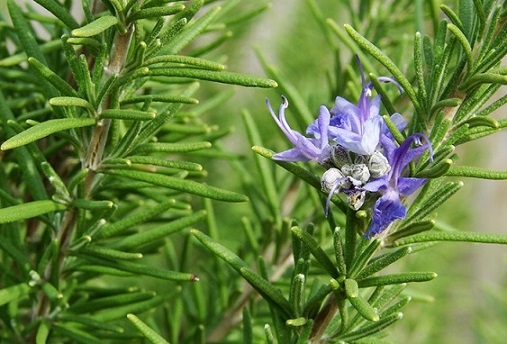The Phytochemical Carnosol Found in Rosemary Destroys Influenza A Virus and Reduces Lung Inflammation
Nikhil Prasad Fact checked by:Thailand Medical News Team Apr 11, 2025 1 day, 18 hours, 52 minutes ago
Medical News: A new study by Chinese researchers has uncovered the powerful antiviral properties of carnosol, a naturally occurring compound found in rosemary, against the deadly influenza A virus (IAV). The groundbreaking research was a collaboration between scientists from The Affiliated Hospital of Qingdao University, Ocean University of China, and the Marine Science and Technology Center in Qingdao.
 The Phytochemical Carnosol Found in Rosemary Destroys Influenza A Virus and Reduces Lung Inflammation
The Phytochemical Carnosol Found in Rosemary Destroys Influenza A Virus and Reduces Lung Inflammation
Carnosol, a plant-derived substance long valued in traditional Chinese medicine, is already known for its antioxidant, anti-inflammatory, and anticancer properties. Now, researchers have discovered that it can directly disrupt the influenza virus and suppress the virus's ability to replicate in the body. This
Medical News report explores how carnosol was shown to kill the virus by breaking apart its outer envelope and by blocking a key signaling pathway in human cells that the virus hijacks to multiply.
How Carnosol Disarms and Destroys the Flu Virus
Using both cell cultures and mouse models, the scientists found that carnosol had strong antiviral effects against the H1N1 strain of influenza A virus. In lab-grown human and animal cells, the compound significantly reduced the number of viral particles, demonstrating a clear inhibitory effect without being toxic to the cells at lower concentrations.
Further laboratory tests, including electron microscopy, showed that carnosol directly damaged the viral envelope—a protective layer the virus needs to infect host cells. Once this envelope is compromised, the virus is unable to effectively attach or enter the cells, halting its ability to spread.
In addition to physically damaging the virus, carnosol also interferes with the Jak2/STAT3 signaling pathway, a process used by the influenza virus to enhance its replication and trigger excessive inflammation in the body. When this pathway is suppressed, the virus struggles to grow and the associated inflammation is reduced, resulting in milder symptoms.
Effective Treatment in Mice Comparable to Oseltamivir
To confirm its antiviral action in a living organism, the researchers infected mice with the influenza A virus and treated them with oral doses of carnosol. The results were promising. Not only did the treated mice show significantly higher survival rates, but they also exhibited less lung damage and inflammation when compared to untreated mice.
The lung tissues of the treated mice had fewer viral particles, and the overall symptoms of pneumonia were notably milder. Remarkably, the effectiveness of carnosol was found to be comparable to oseltamivir, a widely used antiviral drug for treating flu infections, suggesting carnosol could be a viable alternative in the future—especially for cases involving drug-resistant strains.
A Natural Compound with Broad Therapeutic Promise
The findings add to
a growing body of research suggesting carnosol may be a highly valuable compound in the treatment of viral infections. Previous studies have already hinted at its potential to interfere with HIV-1 protease and possibly SARS-CoV-2 viral proteins. In this new study, its ability to prevent nuclear entry of viral RNA and reduce inflammation makes it particularly attractive as a dual-action antiviral and anti-inflammatory agent.
Moreover, since carnosol is a natural compound and well-tolerated in both animals and humans, it could be developed into a safer and more accessible therapeutic option for influenza, especially in populations that are vulnerable to side effects from conventional drugs.
Conclusion
This study strongly supports the potential of carnosol as a novel antiviral agent that works by both dismantling the virus and calming the body’s inflammatory response. Unlike many existing flu treatments, it targets new areas of the virus lifecycle and immune modulation, reducing the risk of resistance and offering additional benefits. Given its origin from a common culinary herb and its already established pharmacological profile, carnosol could be quickly advanced into clinical trials as a complementary or alternative flu treatment. With further research, this compound might also be explored for its effects on other respiratory viruses.
The study findings were published in the peer reviewed journal: European Journal of Pharmacology
https://www.sciencedirect.com/science/article/abs/pii/S0014299925003607
For the latest Influenza News, keep on logging to Thailand
Medical News.
Read Also:
https://www.thailandmedical.news/news/japanese-and-american-scientists-finds-that-carnosic-acid-from-the-herb-rosemary-can-be-used-to-treat-covid-19,-long-covid-and-other-diseases
https://www.thailandmedical.news/news/korean-researchers-find-that-the-herb-angelica-tenuissima-nakai-shows-promise-in-fighting-influenza-a
https://www.thailandmedical.news/news/soybean-extract-shows-promise-in-inhibiting-influenza-virus-entry
https://www.thailandmedical.news/articles/herbs-and-phytochemicals
https://www.thailandmedical.news/articles/influenza-or-flu
https://www.thailandmedical.news/pages/thailand_doctors_listings
